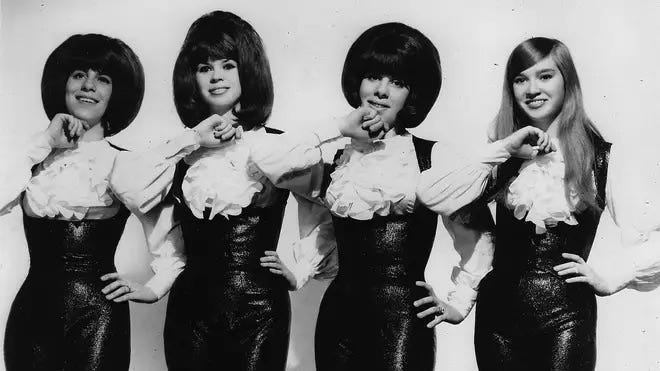Dissolute Angels: Remembering Mary Weiss and the Shangri-Las
In their leather outfits and knee-high boots, they were angels all the same.
Mary Weiss has died. That may not seem like much in a world filled with war and tragedy, but it’s a loss for those who loved her. And for those who remember her as the lead singer of the Shangri-Las, it’s one more hobo’s chalk mark on the sidewalks of time.
Mary was always underestimated. I’m tempted to quote what an Arkansas musician of my acquaintance told me one time about another teenaged performer: “That li’l old gal could sing.”
I suppose Mary will always be the white Ronnie Spector to some people, and her group will always be the white Ronettes. That’s certainly how the music industry marketed them. But Mary could act as well as she could sing. A lot of their songs demanded it. The other singers – Betty Weiss, Marge Ganser, and Mary Ann Ganser – would serve as the Greek chorus as she played the leading role. Watch her in action:
The girl groups that came before the Shangri-Las had hyper-emotional songs, too, but they were dramatic the way evening TV shows were dramatic. A good Shangri-Las song was like a Latin American telenovela. It had grit, danger, a working class sensibility, and more than just a scent of the underworld.
The Shangri-Las were marketed as bad girls, but not that bad. Or, as another song of theirs has it, "good-bad, but not evil.” Their image combined teenaged innocence (Mary was 15 when their most famous song, “Leader of the Pack,” hit Number One) with leather outfits and the occasional quiet rebellion of bad grammar. (The most famous example? “You'd best believe I'm in love: L-U-V.”)
Mary’s long blonde hair distinguished her from the other girls. It could be seen either as a symbol of innocence in a nearly all-white television culture, or as a Veronica Lake-like symbol of sultry and dangerous sexiness.
It wasn’t their most famous record, but “Out in the Streets” was always my favorite. In the nearly-acapella intro, the backup singers are like a choir from – well, not heaven, but certainly not hell. Purgatory, maybe. The otherworldly chorus makes a sharp contrast to Mary’s gritty voice.
“He don’t wear those dirty old black boots no more” – boys in Shangri-Las songs were troublemakers, but only because they were troubled. Nobody had ever loved them, but the Shangri-Las were here to fix that because they had so much love to give. They may have been dissolute angels — their hairdos and knee-high boots told us that — but they were angels just the same.
Mary Weiss was 75 years old.


Nice tribute Rick, thanks for this.